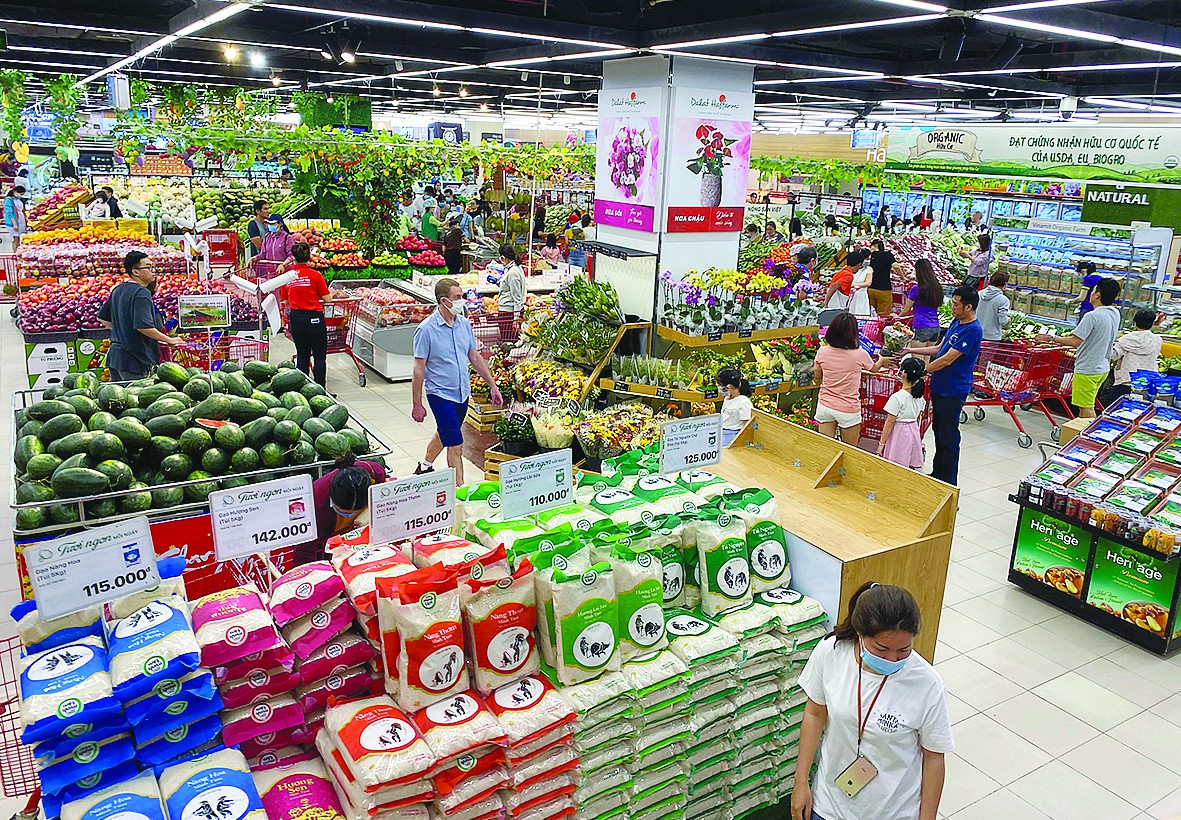CATCHING UP NEW EXPORT TRENDS
02 Tue, 2020
Bringing Vietnamese goods abroad in chain

Since 2017, the Ministry of Industry and Trade has implemented an on-the-spot export program through cooperation with foreign distribution systems. Those who have actively participated in this program include Aeon mall, Lotte...
With a wide network of supermarkets in Japan and South Korea, these systems have supported Vietnamese businesses to standardize the quality of products, packaging, labels and act as a bridge to export Vietnamese goods through Lotte system, Aeon mall across the globe.

Lotte has acted as a bridge to export Vietnamese goods from its network. Photo: CAO THANG
Mr. Nguyen Anh Duc, Permanent Deputy General Director of Ho Chi Minh City Union of Trade Cooperatives (Saigon Co.op), said Saigon Co.op cooperated with NTUC FairPrice system to bring Vietnamese goods to Singapore market. Every year, Saigon Co.op exports more than 200 containers of goods with a variety of product categories.
Total export turnover is estimated at about US $ 6 million and an average increase of 20% per year. This is defined as a fastidious market requiring businesses to meet a lot of technical barriers on quality, food safety... However, the deep and sustainable participation in this market will help businesses in countries go beyond other fastidious markets.
Sharing the same view, Ms. Bui Thi Huong, CEO of Vietnam Dairy Products Joint Stock Company (Vinamilk) said that in 2018, Vinamilk's organic milk products were selling very successful in Singapore. This has opened up a great opportunity for the company to continue to bring milk and dairy products to participate more strongly in other markets such as China, Japan, Korea, Europe...
In fact, enterprises with large production scale and direct export experience often do not face many difficulties in accessing export markets. Even, they are considered to have many advantages when the trade agreement comes into effect and promotes its effectiveness.
In contrast to small and medium enterprises, which have never participated in export before, will face many difficulties due to not grasping the requirements of technical standards and quality of goods. Therefore, the indirect export of Vietnamese products through the distribution system can help businesses minimize risks in business activities, prevent the risk of being returned or stopped being exported.
Moreover, businesses through the distribution system will also be more active in adjusting the quality, form of packaging, product labels... in case the import market is adjusted.
Need policies to attract investment beneficial for agriculture
Mr. Tran Tuan Anh, Minister of Industry and Trade, said that by 2020, complicated economic movements will cause difficulties for the domestic economy. Vietnam has expanded its exports to 180 countries and territories, but the domestic market opening is also very large, at 200%.
Therefore, flexibility in the solution of exporting goods by indirect or direct export will help domestic enterprises reduce business risks. In addition, the Ministry of Industry and Trade has worked with major e-commerce systems to further diversify export channels for Vietnamese goods.
Also according to the Ministry of Industry and Trade, in the coming time, the forecast of the rise of protectionism, unilaterally plus the global economic recession, has strongly affected the domestic economy. Currently, the Government's general policy has been adjusted to adapt to these developments and is having significant effects.
For example, investment attraction will also be adjusted towards increasing the supporting industry for food production and processing. Authorized agencies, commercial counselors in export markets have been directed to actively connect with businesses in providing market demand information for businesses that have conditions for development.
At the same time, the solution of traceability associated with licensing for export goods is also being tightened to avoid frauds of origin and harming the production activities of domestic enterprises.
Vietnam ranks 27 countries in the world with large export turnover. The export market of Vietnamese goods has covered 180 countries and territories. Vietnam also ranks 15th in the scale of exported agricultural products and foods. The number of domestic private enterprises investing in the field of food processing, foodstuffs, agro-aquatic and marine products also continues to increase, estimated at more than 2,200 enterprises/year.
On the other hand, economists analyze, to minimize the risk of trade remedies from export markets in general, as well as to participate sustainably in the global distribution system supply chain, in addition to businesses need to actively invest in deep processing, build distribution chains abroad and brand chains, ministries and localities must focus on selecting and supporting which products to put on the brand chain.
Especially, there must be accurate market forecast information for enterprises to be more active in production, business and export activities. It is necessary to reform administrative procedures on land, taxes, social insurance and the environment; more effective implementation of the policy of integration.
Property protection policies for businesses investing in agriculture must also be taken into account due to the relatively high level of risk for investment. In addition, the association between businesses and farmer households should be improved in the direction of stricter sanctions.
Source: https://www.sggp.org.vn/
Related Post
The true fishmeal carbon footprint
The established Life Cycle Analysis (LCA) methodology to assess the fishmeal carbon footprint only accounts for the vessel fuel and post-harvest processing energy while ignoring the carbon sequestration potential of fish.
View more
Freezing Tropical Fruits: Convenient and Effective Solution with Octofrost Machines
Tropical fruits are always a great choice for providing nutrition and fresh flavor to daily meals.
View more


